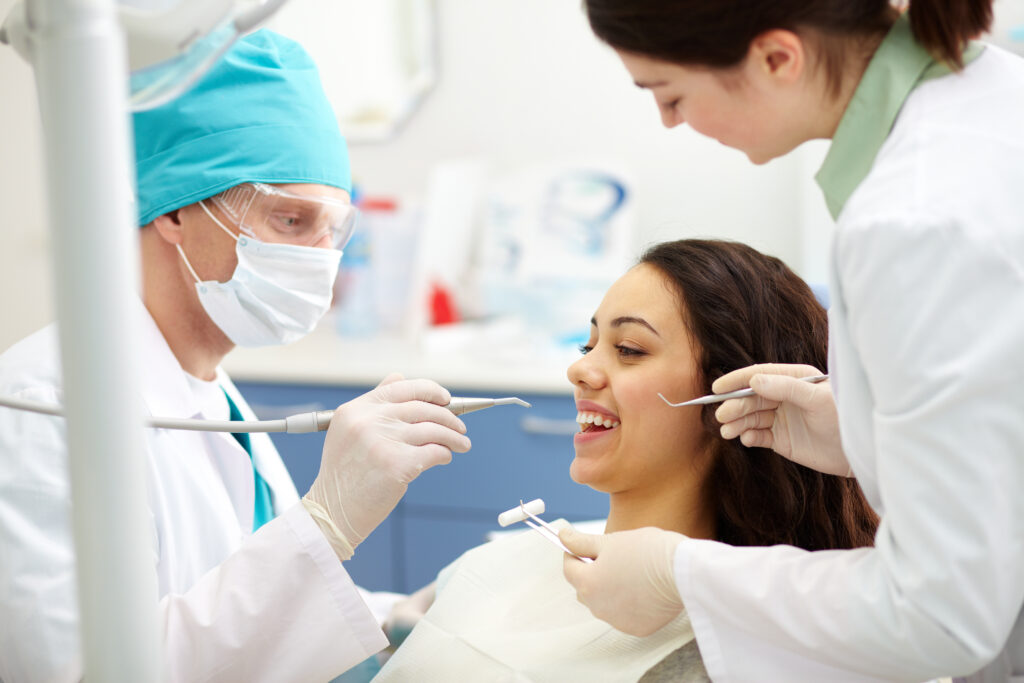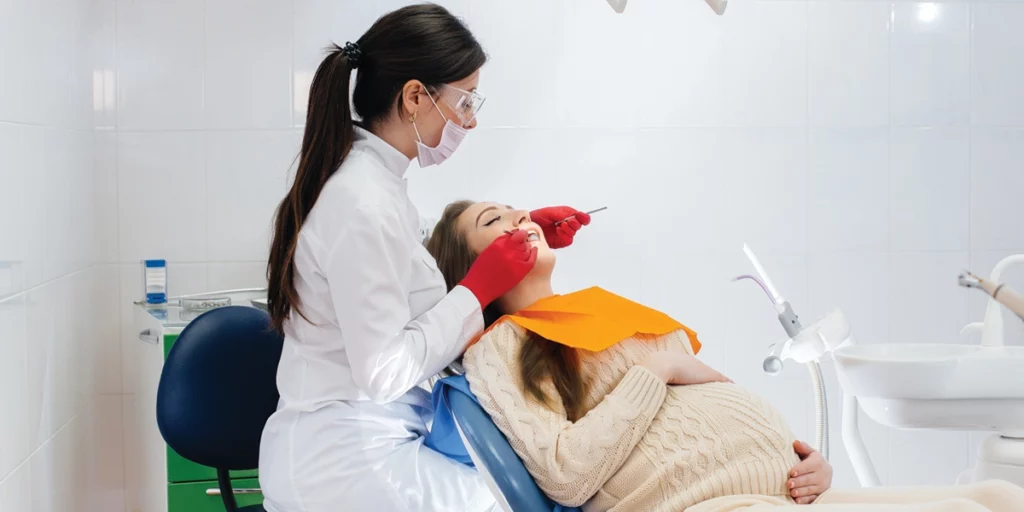IMPORTANCE OF DENTAL CARE FOR WOMEN
Effective dental care is essential for both men and women to sustain oral health for a lifetime. However, it is quite essential for women. Women are more susceptible to oral health problems due to severe hormonal changes. A study has shown that the onset of puberty and a rise in hormone levels can affect the tendency of the mouth and may cause more bacteria to form over the teeth. Without proper dental care, the bacteria can eat away at the enamel, making teeth more prone to cavities.

Hormonal instabilities have a major impact on women, especially during menstruation, pregnancy, breastfeeding, and menopause. Women tend to have high mood swings, which in turn affects oral health and causes tooth decay, cavities, and various other periodontal diseases. Gum disease can impact a woman’s periodontal health in various ways.
PREGNANCY AND DENTAL PROBLEMS
At first glance, it may not seem like oral health has much to do with pregnancy, but maintaining good oral health is critical. A mother’s oral health can affect the overall health of her baby. So paying close attention to dental care and any changes that may arise during pregnancy is important. Bad oral health during pregnancy may also result in premature delivery.
Gingivitis and periodontal diseases are two common diseases in pregnant women. Around 60 % to 75 % of women have gum diseases and cavities during early pregnancy. During pregnancy, hormonal levels rise, resulting in a high intake of sweet foods and a rich diet. It increases the risk of gum swelling and bleeding. Good oral care is safe and essential for your and your child’s well-being. Also, know more about 5 Major Tips for a Healthy Pregnancy
Here are five effective tips for caring for your mouth healthy during pregnancy.

- Brush and floss regularly: Brush your teeth twice daily with fluoride toothpaste and floss at least once daily. It will help remove plaque and bacteria from your teeth and gums.
- Eat a healthy and balanced diet: A diet rich in calcium, phosphorus, and Vitamin D is essential for healthy teeth and gums. Avoid sugary and acidic foods and drinks, as they can cause tooth decay.
- Drink plenty of water: Water helps keep your mouth hydrated and washes away food particles and bacteria that can cause tooth decay.
- Visit your dentist regularly: Inform them that you are expecting so they can take the necessary precautions while you are there. Regular dental check-ups will enable your dentist to identify and address oral health problems before they worsen.
- Practice good oral hygiene habits at home: Use a mouthwash to rinse or a tongue scraper to remove bacteria from your mouth.
By following these tips, you can maintain good oral health during pregnancy, essential for a healthy pregnancy and baby.
DENTAL TREATMENTS DURING PREGNANCY
Dental care that is preventive, diagnostic, and therapeutic while pregnant is healthy. However, it would help if you took several safety measures to protect yourself and your child’s oral health.
- Avoid X-rays during the first trimester: If possible, postpone any non-emergency dental X-rays until your baby is born. However, if X-rays are necessary, your dentist will take precautions to minimize radiation exposure.
- Use local anesthesia: Local anesthesia is generally safe during pregnancy, but it’s important to let your dentist know you are pregnant so they can use the minimum amount necessary.
- Postpone non-essential treatments: If possible, postpone non-essential dental treatments until your baby is born. Still, seeking treatment immediately is important if you have a dental emergency, such as a toothache or infection.
DENTAL CARE DURING MENSTRUATION
Teeth become more sensitive during the time of a woman’s menstrual cycle. About three to four days before the start of their period, most women experience bleeding gums, bright red and swollen gums, and ulcers on the inside of the cheek. This condition is called menstruation gingivitis. It typically occurs before a woman’s period and clears up once it has started. An increase in hormones such as estrogen and progesterone in the body and plaque build-up mainly causes this.

DENTAL PAIN DURING MENSTRUATION
Experiencing tooth or other body pain during your periods is due to hormonal changes. Moreover, studies have shown that certain treatments are more effective only at certain menstrual cycle stages. Some women have been known to experience consistent monthly signs of oral health while on their periods. However, professional dental cleaning is suggested after a week of your period, and tooth extraction or filing can be done just after your period gets finished.
Toothaches can lead to a headache.
The most common symptoms of menstruation are toothaches and headaches. You should see your dentist right away if your toothache is severe. You can also experiment with natural painkillers at home. Try using medically prescribed sprays to numb the pain if it persists. After your menstruation has ended, schedule an appointment with your dentist.
DENTAL CARE DURING MENOPAUSE
How does menopause affect your dental health? It is the time that marks the end of your menstrual cycle. It is a natural biological process. It has physiological and hormonal changes in women that give rise to adaptive changes at both systemic and oral levels. Menopause occurs between the age of 40 – 50 years. You may experience a burning mouth, dry mouth, cavities, etc.

The body’s ability to fight off minor infections or maintain a healthy balance of bacteria in the oral environment is easily decreased by hormonal changes just before menopause. It is because the hormonal changes through menopause directly affect the teeth and gums, which are extremely sensitive during this time.
TIPS FOR MAINTAINING GOOD ORAL HEALTH
To avoid serious dental issues during menopause, one should adhere to certain guidelines for preserving good oral health, including:
- You should provide your dentist with a comprehensive dental and physical health summary.
- Undergo any necessary tests and x-rays as advised by your dentist.
- Maintain a rigorous oral hygiene routine, regular brushing, flossing, and receiving professional dental cleanings.
- Utilizing fluoride-containing toothpaste to help prevent dental caries.
- Reducing the consumption of sugar and sugary food and drinks.
- It is advised to stay well hydrated during this time.
DENTAL TREATMENTS DURING MENOPAUSE
Hormonal changes during menopause have extreme effects on oral health. However, it’s important to note that dental treatments during menopause may vary depending on individual circumstances and should be discussed with a dental professional.
Some of the dental treatments that are recommended during menopause include:
- Periodontal therapy: Hormonal changes during menopause can cause an increased risk of gum disease. Periodontal therapy, such as scaling and root planing or laser therapy, can help treat and prevent gum disease.
- Dental restorations: Menopause may also increase tooth decay and loss risk. Dental restorations such as fillings, crowns, or implants may be recommended to restore the health and appearance of damaged or missing teeth.
- Oral cancer screening: Menopausal women are at a higher risk of developing oral cancer. Regular oral cancer screenings can help detect and treat any abnormalities early.
- Saliva substitutes: Menopause can lead to dry mouth, increasing the risk of dental decay. Saliva substitutes may be recommended to help maintain oral moisture and prevent decay.
- Hormone therapy: Hormone therapy may be recommended to help alleviate symptoms of menopause, which may also improve oral health by reducing inflammation and increasing bone density.
DENTAL CARE TIPS FOR WOMEN

Here are some important dental care tips for women:
- Always brush and floss your teeth before bed.
- Remember your tongue. Use tongue scrappers to remove the bacteria fully.
- Take care of your gums effectively.
- Drink plenty of water.
- Include a vitamin-rich diet.
- Visit your dentist twice a year for dental check-ups and dental cleaning.
IMPORTANCE OF REGULAR DENTAL CHECK-UPS
You cannot prevent the build-up of plaque, tooth erosion, or the development of cavities; thus, routine dental check-ups have several advantages. A simple commitment to routine dental check-ups will enable you to prevent all the problems mentioned above and ensure good oral health.
ORAL HYGIENE PRACTICES
Here are five tips for good oral habits for maintaining your teeth health:
- Brush your teeth at least twice a day and floss daily.
- Drink plenty of water.
- Avoid smoking and drinking.
- Limit sugary food items and eat a healthy and balanced diet.
- Visit your dentist to have regular dental check-ups.
NUTRITIONAL RECOMMENDATIONS FOR TEETH AND GUMS
A healthy diet is crucial in maintaining good oral health, from strengthening your teeth to freshening your breath. Here are the top 10 foods and drinks with surprising oral health benefits.
CONCLUSION
Regular brushing and flossing will greatly improve your dental health, but regularly visiting the dentist will quickly spot and address all dental issues. As with all medical treatments, preventative dental care can save time, money, and energy.

